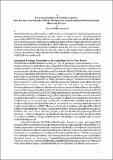Files in this item
From imperialism to failed liberal peace : how Europe contributed to MENA's failing states system and how MENA blowback threatens Europe
Item metadata
| dc.contributor.author | Hinnebusch, Raymond | |
| dc.contributor.editor | Gillespie, Richard | |
| dc.contributor.editor | Volpi, Frederic | |
| dc.date.accessioned | 2019-02-21T00:30:58Z | |
| dc.date.available | 2019-02-21T00:30:58Z | |
| dc.date.issued | 2017-08-21 | |
| dc.identifier | 251028218 | |
| dc.identifier | 955a8fa6-0d25-4c7a-9198-05e24316f4ec | |
| dc.identifier.citation | Hinnebusch , R 2017 , From imperialism to failed liberal peace : how Europe contributed to MENA's failing states system and how MENA blowback threatens Europe . in R Gillespie & F Volpi (eds) , Routledge Handbook of Mediterranean Politics . Routledge Taylor & Francis Group , Abingdon , pp. 60-71 . | en |
| dc.identifier.isbn | 9781138903982 | |
| dc.identifier.isbn | 9781315696577 | |
| dc.identifier.other | ORCID: /0000-0001-5800-6606/work/60630211 | |
| dc.identifier.uri | https://hdl.handle.net/10023/17106 | |
| dc.description.abstract | The Middle East and North Africa area was profoundly shaped under European imperialism, especially by the “peace to end all peace” imposed after WWI; the Euro-Mediterranean partnership was designed to deal with the long term consequence: a dysfunctional regional states system. It would establish a liberal peace on Europe’s Mediterranean borders via the export of economic and political reform, via soft rather than hard power, through the spread of norms by example quite different from the failed US attempt at military hegemony. Despite Europe’s benign self-image, the distinction between the European and American projects was only ever one of degree. First, the asymmetric hub-and-spokes system the Euro-Med project created reproduced the power imbalance between core and periphery and enabled the resulting arrangements to serve European interests first. Second, the incongruence between Europe’s export of neo-liberalism (with its associated inequalities and deconstruction of the social contrast in MENA states) and the attempted export of “democracy,” which helped de-legitimize MENA states, was exposed by the Arab Uprising, which helped create a MENA states system of failed or more repressive states, rather than a liberal peace. Europe reaped what it sowed in the form of massive refugee flows, terrorism and instability. What went wrong? | |
| dc.format.extent | 11 | |
| dc.format.extent | 693216 | |
| dc.language.iso | eng | |
| dc.publisher | Routledge Taylor & Francis Group | |
| dc.relation.ispartof | Routledge Handbook of Mediterranean Politics | en |
| dc.subject | JZ International relations | en |
| dc.subject | SDG 16 - Peace, Justice and Strong Institutions | en |
| dc.subject.lcc | JZ | en |
| dc.title | From imperialism to failed liberal peace : how Europe contributed to MENA's failing states system and how MENA blowback threatens Europe | en |
| dc.type | Book item | en |
| dc.contributor.institution | University of St Andrews. School of International Relations | en |
| dc.date.embargoedUntil | 2019-02-21 | |
| dc.identifier.url | https://www.routledge.com/9781138903982 | en |
This item appears in the following Collection(s)
Items in the St Andrews Research Repository are protected by copyright, with all rights reserved, unless otherwise indicated.

